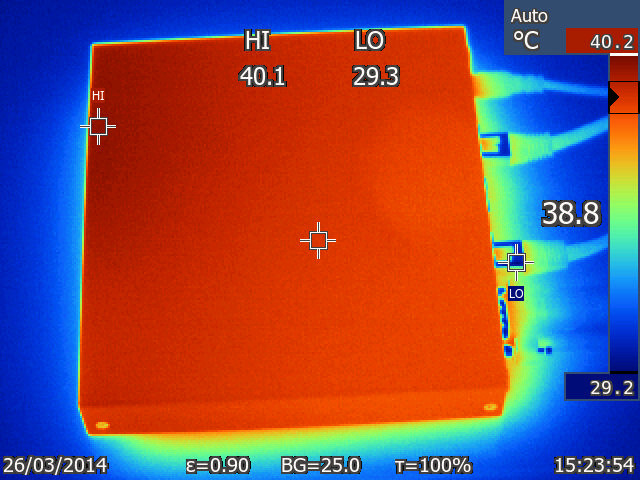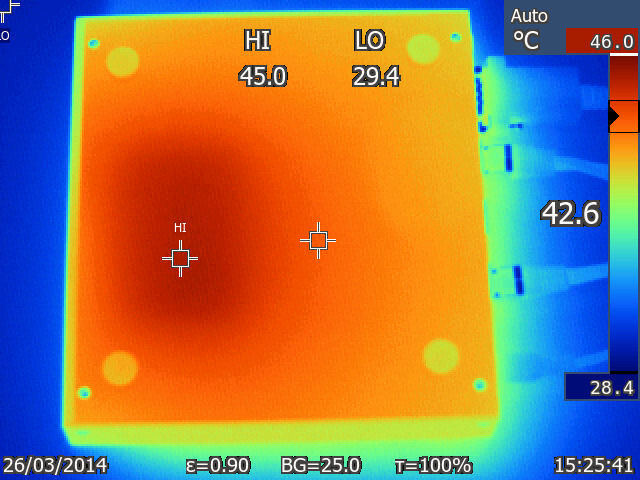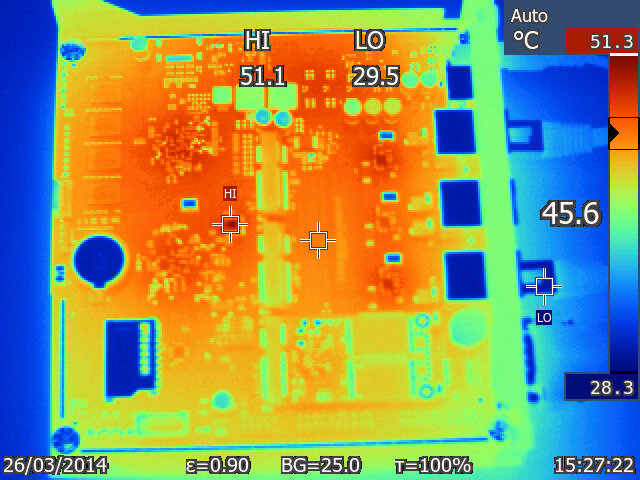New Alix board for 2013
-
Can somebody measure throughput on his APU?
I startet a "nc -l 8888 > /dev/null" on a device on WAN Interface.
then I startet "cat <big file="">| nc <ip_from_device>8888"I dont get more then 10 MByte/s.
What am I doing wrong?</ip_from_device></big>
<big file="">Using Debian Wheezy 64bit, 'nc hera 7777
root@hera:/# netcat -l -p 7777 | dd of=/dev/null bs=1024
8503772+19682 records in
8513324+0 records out
4358821888 bytes (4.4 GB) copied, 45.7555 s, 95.3 MB/sPretty close to the theoretical maximum of 1 GBit when considering TCP/IP overhead, however the CPU is nearly at max (90-95%, 1 core), so the APU can cope with the GBit traffic, but is stressed to the limit in this simple test.
When doing packet forwarding solely in kernel space (without user space processes and thus a lot less context switches/copy operations) the CPU should be able to handle the traffic with ease. Didn't test throughput with smaller, sub-MTU packets though, this should stress the CPU a lot more.Overall a huge improvement over the good old ALIX (had 2 ALIX, now 2 APUs), crypto could be a little faster (~ 30MB/s AES128 CTR + umac128 when doing a simple cat /dev/zero test via SSH connection, compression (obvioulsy) turned off), but since the APU does not have an onboard hardware crypto engine, that's ok in my opinion :)</big>
-
hi
i tried to install the embedded version on a 4GB Kingston SD Card. but it doesn't fit, so i used the 2GB nanobsd edition.
but when i try to boot, i got errors about mounting the root parition, wrong geometry aborting startupcan i fix this by this
https://doc.pfsense.org/index.php/Soekris_6501_USB_Flash_installation#Root_Mount_erroror the USB Boot Problem article?
Yes, that are the steps, you have to go, but 'set kern.cam.boot_delay="5000"' will be enough.
-
Is there a way to speed up crypto? Like a Mini-PCI crypto accelerator?
-
-
No such slot on the board.
?
http://pcengines.ch/apu1c.htm
"Expansion: 2 miniPCI express (one with SIM socket)"
"Use with …
wle200nx miniPCI express wireless module"Looks like it does to me?
-
MiniPCI Express not just MiniPCI
Use Google
-
I just tracked down my performance-problem with the APU: It is a problem with the realtek-chipset on freebsd! That Device is unusable with pfSense yet:
The same APU, one time bootet with ipfire, one time with pfSense:
ipfire(linux):
[root@ipfire ~]# iperf -c 192.168.0.67 -p 1000
–----------------------------------------------------------
Client connecting to 192.168.0.67, TCP port 1000
TCP window size: 21.0 KByte (default)[ 3] local 192.168.0.7 port 32863 connected with 192.168.0.67 port 1000
[ ID] Interval Transfer Bandwidth
[ 3] 0.0-10.0 sec 667 MBytes 559 Mbits/secpfSense-2.1(FreeBSD-8.3)
[2.1-RELEASE][root@pfSense.localdomain]/root(14): iperf -c 192.168.0.67 -p 1000
–----------------------------------------------------------
Client connecting to 192.168.0.67, TCP port 1000
TCP window size: 65.0 KByte (default)[ 3] local 192.168.0.121 port 9760 connected with 192.168.0.67 port 1000
[ ID] Interval Transfer Bandwidth
[ 3] 0.0- 2.7 sec 8.62 MBytes 26.4 Mbits/secI'll try to build a NanoBSD-Image from 10.0 …
-
hi
i tried to install the embedded version on a 4GB Kingston SD Card. but it doesn't fit, so i used the 2GB nanobsd edition.
but when i try to boot, i got errors about mounting the root parition, wrong geometry aborting startupcan i fix this by this
https://doc.pfsense.org/index.php/Soekris_6501_USB_Flash_installation#Root_Mount_erroror the USB Boot Problem article?
Yes, that are the steps, you have to go, but 'set kern.cam.boot_delay="5000"' will be enough.
Thanks for your reply. Will this maybe added to the nanobsd image as default? also the automatic mapping of the new APU interfaces re0 re1 re2?
I used now the normal installer from a usb stick. i installed the embedded kernel and set a ramdisk for /tmp and /var in the webconfigurator. is this enough, that my SD card will not die in a few weeks or have i better to reinstall the whole boxes with the embedded edition?
regards angelo
-
What makes you think that it's the Realtek driver rather than something else? I'm fully prepare to believe it might be but just curious as to your thinking.
Also your window size is not consistent between those tests so the numbers are not directly comparable. Though the larger window in pfSense should be favourable.It's better to run Nano on flash media.
Steve
-
@ tmueko
Nice test! would be interesting to test with freebsd 10, hoping the troughput is increasing!
-
I just tracked down my performance-problem with the APU: It is a problem with the realtek-chipset on freebsd! That Device is unusable with pfSense yet:
The same APU, one time bootet with ipfire, one time with pfSense:
ipfire(linux):
[root@ipfire ~]# iperf -c 192.168.0.67 -p 1000
–----------------------------------------------------------
Client connecting to 192.168.0.67, TCP port 1000
TCP window size: 21.0 KByte (default)[ 3] local 192.168.0.7 port 32863 connected with 192.168.0.67 port 1000
[ ID] Interval Transfer Bandwidth
[ 3] 0.0-10.0 sec 667 MBytes 559 Mbits/secpfSense-2.1(FreeBSD-8.3)
[2.1-RELEASE][root@pfSense.localdomain]/root(14): iperf -c 192.168.0.67 -p 1000
–----------------------------------------------------------
Client connecting to 192.168.0.67, TCP port 1000
TCP window size: 65.0 KByte (default)[ 3] local 192.168.0.121 port 9760 connected with 192.168.0.67 port 1000
[ ID] Interval Transfer Bandwidth
[ 3] 0.0- 2.7 sec 8.62 MBytes 26.4 Mbits/secI'll try to build a NanoBSD-Image from 10.0 …
Hi I just did a quick test from my NAS running Debian Jessie and connected over a 1GB switch to the APU.
iperf -c pfsense -i ⏎ iperf: option requires an argument -- i ------------------------------------------------------------ Client connecting to pfsense, TCP port 5001 TCP window size: 85.0 KByte (default) ------------------------------------------------------------ [ 3] local 192.168.1.30 port 46982 connected with 192.168.1.1 port 5001 [ ID] Interval Transfer Bandwidth [ 3] 0.0-10.0 sec 357 MBytes 299 Mbits/secPfsense running 2.1.1 Prerelease
-
I have somewhat different results:
10.0.8.3 10.0.8.1 (LAN - re0) ---------- ---------- | PC1 |--------------| APU | ---------- ---------- | 10.0.42.237 (WAN - re2) | | ----------- | PC2 | 10.0.42.2 ------------ pfSense 2.1
- portforward from WAN to PC1
- 50 concurrent iperf connections from PC1 to PC2
- 50 concurrent iperf connections from PC2 to PC1
- Quite constant 440~445 Mbit/s (see quotes below)
@PC1:
TCP window size: 85.3 KByte (default)
[SUM] 2230.0-2240.0 sec 259 MBytes 217 Mbits/sec
[SUM] 2240.0-2250.0 sec 262 MBytes 219 Mbits/sec
[SUM] 2250.0-2260.0 sec 257 MBytes 216 Mbits/sec
[SUM] 2260.0-2270.0 sec 259 MBytes 217 Mbits/sec
[SUM] 2270.0-2280.0 sec 257 MBytes 215 Mbits/sec
[SUM] 2280.0-2290.0 sec 260 MBytes 219 Mbits/sec
[SUM] 2290.0-2300.0 sec 256 MBytes 215 Mbits/sec
[SUM] 2300.0-2310.0 sec 258 MBytes 217 Mbits/sec
[SUM] 2310.0-2320.0 sec 259 MBytes 217 Mbits/sec
[SUM] 2320.0-2330.0 sec 259 MBytes 217 Mbits/sec
[SUM] 2330.0-2340.0 sec 260 MBytes 218 Mbits/sec
[SUM] 2340.0-2350.0 sec 260 MBytes 218 Mbits/sec
[SUM] 2350.0-2360.0 sec 259 MBytes 217 Mbits/sec
[SUM] 2360.0-2370.0 sec 262 MBytes 219 Mbits/sec
[SUM] 2370.0-2380.0 sec 257 MBytes 216 Mbits/sec
[SUM] 2380.0-2390.0 sec 260 MBytes 218 Mbits/sec
[SUM] 2390.0-2400.0 sec 260 MBytes 218 Mbits/sec
[SUM] 2400.0-2410.0 sec 258 MBytes 217 Mbits/sec
[SUM] 2410.0-2420.0 sec 260 MBytes 218 Mbits/sec
[SUM] 2420.0-2430.0 sec 263 MBytes 220 Mbits/sec@PC2:
TCP window size: 85.3 KByte (default)
[SUM] 2230.0-2240.0 sec 271 MBytes 227 Mbits/sec
[SUM] 2240.0-2250.0 sec 270 MBytes 226 Mbits/sec
[SUM] 2250.0-2260.0 sec 270 MBytes 227 Mbits/sec
[SUM] 2260.0-2270.0 sec 268 MBytes 225 Mbits/sec
[SUM] 2270.0-2280.0 sec 268 MBytes 225 Mbits/sec
[SUM] 2280.0-2290.0 sec 269 MBytes 226 Mbits/sec
[SUM] 2290.0-2300.0 sec 270 MBytes 226 Mbits/sec
[SUM] 2300.0-2310.0 sec 270 MBytes 226 Mbits/sec
[SUM] 2310.0-2320.0 sec 271 MBytes 227 Mbits/sec
[SUM] 2320.0-2330.0 sec 269 MBytes 226 Mbits/sec
[SUM] 2330.0-2340.0 sec 273 MBytes 229 Mbits/sec
[SUM] 2340.0-2350.0 sec 271 MBytes 227 Mbits/sec
[SUM] 2350.0-2360.0 sec 268 MBytes 225 Mbits/sec
[SUM] 2360.0-2370.0 sec 268 MBytes 225 Mbits/sec
[SUM] 2370.0-2380.0 sec 270 MBytes 227 Mbits/sec
[SUM] 2380.0-2390.0 sec 270 MBytes 226 Mbits/sec
[SUM] 2390.0-2400.0 sec 271 MBytes 227 Mbits/sec
[SUM] 2400.0-2410.0 sec 269 MBytes 226 Mbits/sec
[SUM] 2410.0-2420.0 sec 269 MBytes 225 Mbits/sec
[SUM] 2420.0-2430.0 sec 269 MBytes 226 Mbits/sec -
After pushing traffic for 3 hours i took a look at the board with our thermal camera.
IR000609: From top, closed case.
IR000611: From bottom, closed case.
IR000613: From top, open case.
-
Some great images there, cheers!
What colour case do you have BTW (I'm thinking about emissivity)?
-
It's the black case.
-
MiniPCI Express not just MiniPCI
Use Google
Oops :-[
Google tells me there are no Mini-PCIe crypto accelerators, so I guess it's moot anyway.
-
I have somewhat different results:
10.0.8.3 10.0.8.1 (LAN - em0) ---------- ---------- | PC1 |--------------| APU | ---------- ---------- | 10.0.42.237 (WAN - em2) | | ----------- | PC2 | 10.0.42.2 -----------You em0 .. em2 on your APU? Is that the 4GB Device? Can you post a dmesg from boot?
-
Nice, love the thermal images. :)
You surely mean re0-1 though rather than em?
Steve
-
Wooops.
Yes i meant re.
I have a dual miniPCIe gbit card which is (em).
Going to test the board with them tomorrow. -
I have received my board today :)
I will be using this board to upgrade an Alix system.
The fit of the board in the Alix case is no good :(
EDIT: Netgate told me that my case is an old Netgate made case (not PCEngine), and do not work with APU board :(The board is curved and it's impossible to align the leds an reset button with the case holes.
EDIT: Netgate told me that my case is an old Netgate made case (not PCEngine), and do not work with APU board :(I hope Netgate get the new cases soon.
(I just order 2 correct cases)


